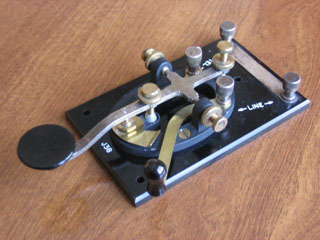 |
| WW2-era US military telegraph key, via Wikimedia |
Understandably, while the telegraph wires spread across the world, many people failed to grasp how the telegraph actually worked, which led to some comic misunderstandings, as Standage relates:
One magazine article, 'Strange Notions of the Telegraph' gives several examples of incomprehension: "One wiseacre imaged that the wires were hollow, and that papers on which the communications were written were blown through them, like peas through a pea shooter. Another decided that the wires were speaking tubes". And one man in Nebraska thought the telegraph wires were a kind of tightrope; he watched the line carefully, "to see the man run along the wires with the letter bags".
In one case a man came into a telegraph office in Maine, filled in a telegraph form, and asked for his message to be sent immediately. The telegraph operator tapped it out in Morse to send up the line and then spiked the form on the "sent" hook. Seeing the paper on the hook, the man assumed it had yet to be transmitted. After waiting a few minutes, he asked the telegrapher, "Aren't you going to send that dispatch?" The operator explained that he already had. "No, you haven't," said the man, "there it is now on the hook".
Another story concerned a woman in Karlsruhe, Prussia, who went to a telegraph office in 1870 with a dish full of sauerkraut, which she asked to have telegraphed to her son, who was a soldier fighting in the war between Prussia and France. The operator had great difficulty convincing her that the telegraph was not capable of transmitting objects. But the woman insisted that she had heard of soldiers being ordered to the front by telegraph. "How could so many soldiers have been sent to France by telegraph?" she asked...
The retranscription of the message at the receiving station also confused some people. One woman preparing to send a telegram is said to have remarked as she filled out the telegraph form, "I must write this out afresh, as I don't want Mrs M to receive this untidy telegram". Another woman, on receiving a telegram from her son asking for money, said she was not so easily taken in; she knew her son's handwriting very well, she said, and the message, transcribed at the receiving office, obviously hadn't come from him.
-Tom Standage, The Victorian Internet, 1998
Having recently reviewed the Crimean War diaries of Mrs Frances Duberly, it's also worth noting that that war (which saw France and Britain invading Russia's Black Sea peninsula territory and besieging Sevastopol) was the first major conflict to be influenced by telegraphic communication. Wires were strung from Bucharest to Varna on the Black Sea, and then a British company laid an undersea cable to the Crimea. Standage records that:
This was bad news for [British commander and Raglan's successor] General Simpson, who was so exasperated by trivial inquiries from his incompetent superiors in London that he is said to have complained that "the confounded telegraph has ruined everything".
For who was better placed to make strategic decisions: the commander at the scene or his distant superiors? In his history of the Crimean War [8 volumes, 1863-87], the historian A.W. Kinglake referred to the telegraph as "that new and dangerous magic" that played into the hands of meddling officials who were nowhere near the battlefield. "Our government did not abuse it," he declared, "but, exposed to swift dictation from Paris, the French had to learn what it was to carry on a war with a Louis Napoleon planted at one of the ends of the wire, and at the other, a commander like Canrobert, who did not dare to meet Palace strategy with respectful evasions, still less with plain, resolute words"
-Tom Standage, The Victorian Internet, 1998
See also:
Map: New Zealand telegraph network in 1868
No comments:
Post a Comment